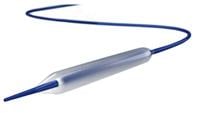
July 26, 2011 – The first patient has been enrolled in the LEVANT 2 clinical trial, a global, multi-center, randomized trial evaluating the safety and efficacy of Lutonix’s Moxy drug-coated balloon compared with a standard angioplasty balloon for the treatment of peripheral arterial disease (PAD). The first case was performed at St. John's Hospital in Springfield, Ill. by Jeff Goldstein, M.D.
LEVANT 2 is the first drug-coated balloon investigational device exemption (IDE) trial to be approved by the U.S. Food and Drug Administration (FDA), and is being conducted to support a pre-market approval (PMA) application for U.S. approval of the Moxy balloon. The trial is expected to randomize approximately 476 patients at up to 55 hospitals worldwide. LEVANT 2 is the largest randomized peripheral drug-coated balloon trial to date, and one of the largest peripheral vascular studies ever conducted.
Randomized patients in LEVANT 2 will be followed for a total of 5 years and independent core laboratories will verify trial outcomes. The primary safety endpoint is a composite of freedom from all-cause peri-operative death and freedom at one year from amputation, re-intervention and death. The primary efficacy endpoint is primary patency at one year. Kenneth Rosenfield, M.D. (Massachusetts General Hospital, Boston, Mass.), and Prof. Dierk Scheinert (Heart Center Leipzig/Park Hospital, Leipzig, Germany) are the co-principal investigators of the trial.
"We are very pleased to be the first center to contribute to such an important trial. We believe drug-coated balloons may play an important role in the future of peripheral interventions, and we are proud to be involved in such a well-designed, carefully controlled trial to explore this promising new therapy," said Goldstein, site principal investigator at St. John's Hospital.
Co-investigator Krishna Rocha-Singh, M.D., added, "With 8-12 million patients known to suffer from PAD and a paucity of durable, highly effective therapies, patients and physicians are in need of a game-changing treatment modality. The LEVANT 2 trial will help us determine whether a drug-coated balloon can fill this gap."
Drug-coated balloons have received growing attention in recent years as physicians increasingly look for effective ways to treat diseased leg arteries without having to leave a permanent stent implant behind. Like the drug-eluting stents commonly used in the heart, the Moxy balloon delivers a powerful restenosis-fighting drug to the artery. However, unlike a stent, the Moxy balloon is removed from the body after use, leaving nothing but the drug behind in the artery.
Physician enthusiasm for the drug-coated balloon concept has been bolstered by encouraging results from early trials like LEVANT 1, a precedent study to LEVANT 2. LEVANT 1 was a 101-patient randomized trial in which the Moxy balloon was compared to standard angioplasty for the treatment of diseased femoropopliteal arteries. The trial showed the Moxy balloon had the ability to safely and substantially inhibit restenosis.
"There is tremendous enthusiasm within the medical community about the potential for drug-coated balloons to improve outcomes for our patients," said Rosenfield. "However, because the field is young, we need data from large, randomized controlled clinical trials that are independently validated. Because of its scientific rigor, LEVANT 2 will help address this need. On behalf of Dr. Scheinert and myself, we congratulate St. John's on their enrollment of the first patient in this landmark trial."
For more information: www.lutonix.com


 January 05, 2026
January 05, 2026 









